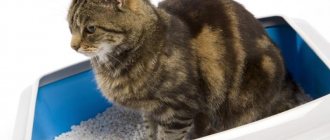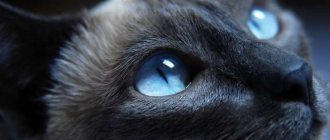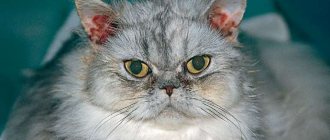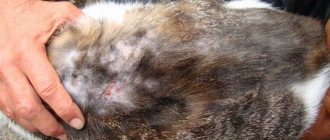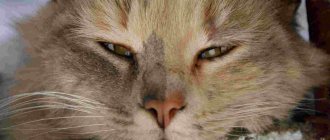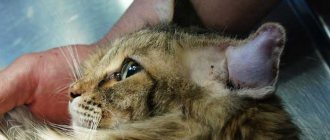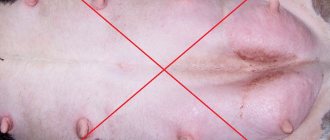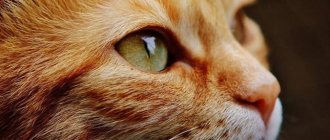There are a number of reasons for the fact that a small kitten may not go to the toilet for several days. Namely:
- Stress caused by a change in environment. If, after you brought the animal into the house, it has not relieved itself for several days in a row, there is no need to sound the alarm. This state of affairs is due to the intense stress associated with moving. However, if bowel movement has not occurred after five days, you should consult a doctor or look for other reasons.
- Mother's inexperience. Probably not many people know that in the first month after birth, kittens are not able to independently cope with their natural needs. In this case, their mother comes to their aid and massages the abdomen. If this does not happen, the kitten simply cannot poop.
- The condition of the kitten’s digestive system is very negatively affected by the rapid transition to “adult food”. It is best if he begins to receive adequate nutrition gradually, while also being fed with mother's milk.
- Congenital intestinal pathology. This is a fairly serious problem, due to which the kitten cannot poop quietly. In this case, you simply cannot do without the intervention of a veterinarian.
Possible complications
It is advisable to check the cat's litter box several times a day to notice any changes or simply to clean it. If you see that your cat's litter box has been left untouched for a long time, you should immediately take appropriate action and show your pet to a specialist. Delay in these circumstances will only harm the animal.
The accumulation of feces and uric acid is dangerous for the cat’s life
Urine and feces do not injure the body at all if they leave it in a timely manner. If delays occur, gradual intoxication occurs, which every hour increasingly threatens the pet’s health:
- The longer digested food sits in the intestines, the more “juices” are squeezed out of it, and the drier the final product becomes. As a result, the longer the cat does not go to the toilet, the more difficult it will be for him to do so later. Feces harden and in extreme situations can even damage the walls of the esophagus;
Normally, your pet's intestines are able to independently get rid of digested food.
- Stagnant urine in extreme cases leads to rupture of the bladder, but usually this does not happen. A more common result is the appearance of inflammatory processes due to infection of the genitourinary system by bacteria from stagnant urine. In addition, uric acid gradually dissolves the walls of the bladder, which leads to cystitis.
How many days can a kitten go without walking (stress when moving)
Kittens visit the litter box up to 3 times a day. More or less is considered a deviation in the functioning of the digestive tract. The first option (increasing trips to the toilet) indicates poor functioning of the gastric mucosa.
Be sure to read:
How to remove the smell of cat urine from shoes - special means: how to remove and what to do
The second option may be an indicator of more serious problems with the baby’s health:
- inflammation of the gastrointestinal tract;
- adhesive disease;
- hernia and scarring;
- swelling or rupture of the anal canal.
But don't panic ahead of time. Kittens also experience problematic bowel movements after a long trip, weaning from their mother's milk, or when moving to a new home. The pet needs to be given some time to adapt. If after this the animal suffers from constipation, it is necessary to consult a veterinarian.
Causes of difficulty urinating
Let's start with pathologies of the urinary tract, which are the most common reasons for a cat’s inability to use the litter box for its intended purpose. As already mentioned, regardless of living conditions, all cats (males in the first place) are susceptible to such pathologies to varying degrees. Therefore, it is advisable for every owner to know the first signs of the disease in order to react in time.
If your cat cannot go to the litter box for more than a day, you should take him to the vet as soon as possible.
Table 1. Pathologies of the urinary tract
| Disease | Description | Symptoms |
| Cystitis | Cystitis can be primary or secondary. Secondary cystitis occurs due to the growth of pathogenic bacteria in the bladder or kidneys. Primary occurs regardless of other diseases and is most often associated with hypothermia of the animal. Secondary cystitis can begin with indirect symptoms (cough, conjunctivitis), making its identification difficult | 1. The cat began to go to the toilet less often. 2. Thirst has noticeably increased. 3. Emptying the bladder is accompanied by loud meowing. 4. Traces of blood or pus can be seen in the urine; its color darkens, acquiring a deep amber hue. 5. When trying to palpate the abdomen, the pet resists due to painful sensations |
| Urolithiasis disease | ICD is dangerous because it is almost impossible to recognize it in the early stages. It becomes obvious only after blockage of the urinary tract, when the stone blocks the urethra, causing severe suffering for the pet. If left untreated, the cat develops anuria, in which the kidneys stop producing urine, leading to intoxication of the body. The cat begins to vomit, after which he dies in the absence of medical attention | 1. The cat often visits the litter box, but his visits are often ineffective. 2. Urination is accompanied by a loud meow associated with pain from moving the stone. 3. Due to the difficulties described, the cat begins to empty the bladder in unintended places. 4. The animal loses its appetite and becomes lethargic |
| Urethral obstruction | Like UCD, urethral obstruction involves blockage of the urethra and the inability to empty the bladder. However, the plugs that occur with this disease are different from stones and are formed from accumulated proteins, crystals and grains of sand that settle in the urethra. Less commonly, obstruction is caused by tumors that block the urethra or spasm of the urethra. | 1. The cat periodically visits the litter box due to the fact that it is not possible to empty its bladder at one time. 2. Urination is accompanied by loud meowing due to associated pain. 3. Due to the difficulties described, the cat begins to empty the bladder in unintended places. 4. The animal may seem overexcited and not find rest. |
Sexual hunting
Ignoring the litter tray for a long time does not always have hidden pathological reasons. Uncastrated animals during the period of sexual heat exhibit an unusual indifference to both food and toilet.
To avoid signs of sexual heat, veterinarians advise neutering pets.
Due to the enlargement of the gonads, blockage of the urinary tract may also occur, but now the cause is not stones or plugs, but discharge from the genitals, which does not threaten the life of the animals. At the end of the search for a partner, the animal returns to its normal life and does not need treatment.
Due to the swelling of the gonads, using a litter box can sometimes cause discomfort in cats during heat. Therefore, if your pet is not neutered, it makes sense to think about diapers for the period of sexual heat.
What to do if there are deviations
Violation of the frequency of toilet visits by a small kitten is usually associated with stressful situations. Such factors disappear by themselves when the animal goes through an adaptation period. The situation is more complicated when urination is impaired due to health problems. In this case, the kitten can either walk too often or too rarely.
If a kitten pees frequently, then most likely he has developed cystitis, a disease of the urinary organs, or urolithiasis. The baby will often run up to the tray, but the volume of urine will be catastrophically small. Sometimes there is blood in the urine.
Frequent urges can be caused by drinking too much in hot weather, as well as diabetes. Urinary incontinence is accompanied by a large amount of fluid released and no bleeding. The same signs are characteristic of marking territory.
Cystitis most often occurs in adult kittens. The reasons may be:
- drafts;
- sand in the kidneys;
- impaired metabolism;
- mineral imbalance;
- sexual infections;
- predominance of dry food, lack of liquid and proteins.
Deviations from the norm should be studied and treated in veterinary clinics.
Urolithiasis can affect cats at any age. Signs of the disease are:
- unsuccessful visit to the tray;
- a tiny amount of urine;
- presence of blood in the urine;
- vomiting and high fever;
- lethargy and apathy.
There are cat breeds that are genetically predisposed to this disease. Among them are Scottish Fold, Persian and Siamese breeds.
Also, frequent urination can be associated with diabetes, stress or enuresis. In any case, assistance to the pet must be qualified and timely. If there is the slightest sign of a pathological condition, you should immediately contact a veterinarian. He will prescribe a number of diagnostic measures and adequate treatment.
A kitten who pees frequently will undergo the following tests:
- blood biochemistry;
- Analysis of urine;
- X-ray;
- comparison of the amount of urine and drink;
- Ultrasound;
- hormone test;
- determination of acetone levels and acid-base balance.
These types of studies will help to identify the nature of the disease of the genitourinary system, make a diagnosis and decide on treatment.
In addition to adequate therapy, it is important to carry out a number of preventive measures for the full functioning of the genitourinary system. Regular medical examinations, proper diet, physical activity, and the optimal amount of drinking will ensure normal urination and healthy urinary tract of the kitten.
Rare urination is just as dangerous to a kitten's health as frequent urination. In such situations, the main cause is pathological processes, both in the genitourinary system and in the body as a whole. Almost 75% of cases of insufficient urine flow or insufficient discharge occur due to cystitis. Lack of proper treatment will invariably lead to a condition such as acute urinary retention.
Having such a diagnosis, a kitten may not walk for more than a day. This is a dangerous phenomenon that often ends in death. The bladder becomes full and bursts. Urine enters the abdominal cavity, which can lead to intoxication of the body and death of the pet.
Kittens need to be fed crushed food.
The pathology most often occurs in male kittens. For females, such a disease is not typical, although it is also sometimes detected. The main cause of the disease is stones that block the urinary tract. Experts identify other factors:
- blockage of the urethra by a blood or mucus clot. Occurs against the background of trauma to the genital organ or an infectious disease, in particular the bladder;
- abnormal kidney function. With renal dysfunction, the kitten’s body can no longer excrete urine even in minimal volumes. The cause may be a malignant tumor or perforation of the kidney;
- spinal injury or infectious disease affecting the spinal cord. The absence of a nervous connection between the genitourinary organs and the spinal cord leads to disruption of their functioning and the cessation of urination of the animal.
Urinary retention of any stage requires urgent treatment. In the clinic, a kitten may be prescribed the following procedures:
- catheterization using a special catheter that is inserted into the urethra. This will help empty your bladder;
- surgical intervention. Prescribed in case of ineffectiveness of repeated catheterization.
We suggest you familiarize yourself with: Rules for caring for a Maine Coon, features of keeping: how to feed a Maine Coon so that it grows big
To prevent advanced cases of impaired urination, the owner of kittens must take preventive measures daily:
Helping a cat with urethral blockage
The best solution that an owner can take if this problem occurs is to take the pet to the veterinarian. After an examination, a specialist will usually insert a catheter through the bladder to remove stagnant fluid from the body. This operation is performed under general anesthesia. When the catheter is inserted, the urethra is washed until the secreted fluid becomes clear.
During urethral catheterization, the cat loses a lot of blood
After the procedure is completed, it is advisable for the cat to stay in the clinic for several days to recover. During this time, the cat is given:
- saline solutions (intravenous and subcutaneous), helping to mitigate the effects of intoxication;
- antispasmodics that relieve pain due to an inflamed urethra;
- antibacterial substances that prevent the spread of infections through the mucous membrane of the urethra.
After catheterization, the cat must undergo recovery procedures
Why the cat doesn't go to the toilet in a big way: reasons
Surgery disrupts the normal functioning of all organs.
Timely detection of constipation in a cat will help prevent the transition of a common disorder into a disease. Diseases in animals develop 2 times faster and in 78% of cases lead to death.
Constipation after surgery
Surgery disrupts the normal functioning of all organs, not just the intestines. Delayed bowel movements in this case may be a consequence of the operation.
No therapeutic measures are required. Recovery occurs through dietary nutrition.
After castration
Carrying out this kind of intervention involves the administration of anesthesia and stress for the cat. Owners who are planning to castrate their pet should take into account that the preparatory stage begins 2-3 days in advance.
A preliminary visit to the veterinarian is recommended 7-10 days before the intended operation. After castration, the cat also requires certain conditions of detention and diet.
If you do not follow your doctor's recommendations, constipation will be an inevitable result of surgery. If constipation occurs after castration, the cat should be shown to a specialist.
After childbirth
If constipation occurs after castration, the cat should be shown to a specialist.
Problems with the passage of feces occur before and after lambing. Especially if the birth was difficult, with a large number of kittens. The cause of constipation: compression of all organs by the fetus. After lambing, the body recovers slowly.
Important! Making treatment decisions on your own is dangerous. Constipation is only a symptom that can indicate the development of diseases and disorders that are completely different in nature: overeating, diabetes, thyrotoxicosis, burns of the intestinal mucosa, etc.
Other reasons
The causes of illness can be divided into two types: basic (common) and rare.
Be sure to read:
How to remove the smell of cat urine: products for removing acrid odors from pets
The first type includes:
- hernia and inflammatory process that began in the paraanal glands;
- infection with worms;
- dietary changes;
- lack of fluid, poor diet (excessive preference for dry food).
- The cat's activity is below average.
The second type is diseases that require long-term treatment:
- oncology;
- ulcers of the gastrointestinal tract;
- diabetes;
- urolithiasis, etc.
Sometimes diseases, the symptom of which is constipation, can be accompanied by other diseases, for example, cystitis - inflammation of the bladder. With cystitis, cats experience problems with urination.
Prevention of diseases of the genitourinary system
Despite the fact that prevention depends on the specific disease, there are general recommendations for owners of cats who have experienced pathologies of this group:
- Avoid overcooling your pet. The longer the pet sits in drafts, the greater the likelihood of a new exacerbation. This especially applies to animals that have had cystitis.
- Dieting. With urolithiasis, the diet is prescribed depending on the type of stone by the veterinarian.
- If you previously gave your cat little water, correct this problem. Drinking fluids will stimulate urination.
Although cats do not require a lot of liquid, it is necessary to provide them with clean water.
- If your pet is overweight, you should get rid of it as soon as possible. Of course, you should not starve a cat. But it is necessary to audit the food consumed.
- Vaccination of pets will help reduce the overall number of diseases. As already mentioned, secondary cystitis occurs due to various infectious diseases, which can be prevented by vaccination, which increases immunity.
Animals that have had kidney problems once are more likely to have them again.
It should be borne in mind that all diseases associated with the kidneys, urethra and urinary tract never go away completely. Having appeared once, they can relapse at the most unexpected moments. Therefore, it is important not only proper treatment, but also the correct recovery of the pet.
Feeding tips for cats prone to constipation
The most important preventative measure for acute or chronic constipation is a balanced diet and quality of food for your pet.
- Products must be fresh. The menu should include vegetables. Food should be varied.
- Do not feed your cat the same food that you eat yourself, because such food is not always suitable for them.
- It is preferable to give liquid food, and if the food is dry, soak it in soup or porridge.
- The optimal temperature is slightly above room temperature.
- Rice, chicken, broth, and boiled meat help delay bowel movements, so they should not be given to your pet often.
- Add special nutritional supplements to the food for cats prone to constipation.
In addition to proper nutrition, your pet needs to be walked, combed on time, and bought toys to keep it active. Neutered cats are more prone to problems with defecation, as they lead a sedentary lifestyle, quickly gain weight and lie down almost all the time. He needs to be taken out for walks more often, provided with climbing equipment, and prevented from overeating.
If you are not sure that you can help your pet on your own, it is better to consult with specialists. If the problems with the toilet are resolved, you need to continue to observe the cat, pay attention to changes in its behavior, and pay attention. Remember, we are responsible for the one we tamed.
Causes of constipation in cats
Recognizing bowel movement disorders is not difficult, but you should take into account the characteristics of your pet when analyzing his trips to the toilet. Acts of defecation are individual and depend on the specific organism. Some cats can go to the litter box up to three times a day without experiencing discomfort. Some cats limit themselves to one trip. The frequency of bowel movements is also affected by the age of the pet.
Causes of constipation range from poor diet to life-threatening conditions
In addition to pathologies, which we will talk about later, constipation can occur for completely everyday reasons:
- Change of food. When switching to dry food, the pet’s gastrointestinal tract begins to work differently, and the change often results in constipation, which goes away on its own as it gets used to it.
- Stressful state. Strong feelings affect the digestive tract and lead to disruption of previous routines in using the litter box.
Stress can be associated with moving, having a new pet, and other more specific reasons.
- Inappropriate tray placement. Some cats outright refuse to use litter boxes located in crowded and noisy places.
- Hairballs getting stuck in the esophagus. If there is no grass in a cat's diet, it becomes more difficult for him to cough up licked fur. As a result, it accumulates in the gastrointestinal tract, preventing the pet from getting rid of it.
Without the additional help of herbs and special pastes, the cat’s gastrointestinal tract may not be able to cope with hairballs.
- Penetration of foreign bodies into the stomach. Curious cats (and kittens in particular) love to taste small parts. If one of these items is swallowed by an animal, the consequences could be dire.
Table 2. Pathologies leading to constipation
| Disease | Description | Symptoms |
| Neoplasms in the intestines | Neoplasms are both malignant (tumors) and benign (polyps). More common in mature and elderly individuals. Obvious symptoms appear a couple of months after the onset of the disease | 1. Loss of body weight. 2. Unreasonable vomiting. 3. Lack of appetite. 4. The animal may suffer from constipation or diarrhea |
| Inflammation of the paraanal glands | Normally, the paraanal glands do not interfere with the animal's bowel movements. Their inflammation leads to the appearance of abscesses, making bowel movements very painful and sometimes impossible. | 1. Increase in temperature. 2. The appearance of an unpleasant odor. 3. Attempts to get rid of the inflamed area by licking. 4. Fidgeting on the floor with your butt |
| Parasitic infestations | To become infected with parasites, it is often enough for a pet to eat a raw piece of meat or lick the owner’s shoes. The disease is not always obvious and, with a small number of worms, can occur unnoticed by the cat owner | 1. Reducing the weight of the animal. 2. There is both an increase and a complete lack of appetite. 3. Digestive disorders: diarrhea, constipation, vomiting. 4. Presence of impurities in feces. 5. Itching in the anal area |
| Dysbacteriosis | Diagnosing dysbiosis in a pet is very difficult due to the lack of clear symptoms. This disease does not threaten the pet's life, but if left untreated, it gradually weakens the animal's immune system, quietly destroying the body from the inside. Disruption of intestinal microflora affects not only digestion, but also overall well-being | 1. Appetite disorders. The appearance of food perversions unusual for a cat. 2. Prolonged diarrhea or constipation. 3. Bloating due to excess gas formation. 4. Dehydration of the body, manifested in deterioration of the coat |
| Haemorrhoids | This disease is not very common among cats, but is worthy of mention. Hemorrhoids can be caused by hormonal imbalances, obesity or poor nutrition. The cause of the pathology may also be an increase in blood sugar. Both mature cats and kittens are susceptible to prolapse of hemorrhoids | 1. Inflammation of the skin around the anus. 2. Blood in bowel movements. 3. Constant licking of the pet's perineum. 4. Long and painful constipation. 5. Dry, hard stool |
Possible problems with urination and defecation in kittens
A small kitten must be properly cared for so that it can develop and grow normally. If he is separated from his mother and finds himself in the house of a new owner, then the adaptation period may be accompanied by stress. A number of negative factors can affect the weakening of an animal’s immunity. This affects the functioning of all body systems. Absence or problems with urination and bowel movements during this period are quite acceptable.
When the kitten has grown up and settled down, has become the owner of an excellent appetite, but does not go to the toilet properly, it is worth wondering if everything is okay with him.
Constipation in a kitten
The following disorders can cause constipation in kittens:
- Stressful state. Stress can be triggered by a variety of factors. For example, a visit to the veterinarian, the presence of other animals in the house. However, the most common is a change of residence. The kitten may not have a bowel movement for two to three days. Then everything returns to normal.
- The cat was separated too early. During this period, when the kitten misses its mother's closeness, the absence of stool may last for 4–5 days. If after this period the situation does not change, then you should seek help from a specialist.
- Wrong diet. If the baby ate natural food before he got to his new home, then you cannot suddenly switch him to dry food. Constipation in a kitten can be caused by too much protein in the diet.
- Worms. Intestinal parasites can cause intestinal blockages. This is a dangerous condition that requires medical attention.
If your baby cannot have a bowel movement for more than five days, he needs help. There are a number of recommendations:
- Microclyster. The procedure is allowed if there are no contraindications, that is, if constipation was caused by an unbalanced diet, and not by a violation of the digestive system.
- Enzyme preparations. Prebiotics can be given to a kitten only after prior consultation with a specialist. Mild laxatives prescribed by a veterinarian may also help (medicines for humans are not suitable).
Enzyme preparations must be prescribed by a veterinarian
- Oils. You can add a few drops of oil to your baby's food. Vaseline is the best option, since it cannot be absorbed into the gastrointestinal tract and does not overload the animal’s liver.
I recently learned about Vaseline oil for cats, but have already tried it. You only need a little bit of it, it’s completely unnoticeable with the kitten’s food. But it helps him go to the toilet, like a mild laxative. But others are not recommended to replace it. The same olive oil is absorbed into the gastrointestinal tract and adversely affects the liver.
Sometimes, as a proven old-fashioned method, it is recommended to use baby soap (a small piece is inserted into the kitten’s anus to irritate the walls of the rectum), but it is still recommended to choose more humane ways to help the pet (the same condensed milk will help less painfully).
Frequent stool
When a kitten suffers from diarrhea, this is a sign of a serious malnutrition problem. This situation will require urgent measures and treatment. The entire course of therapy must be carried out under the supervision of a veterinarian.
The most common reason is a change in diet. If the kitten does not receive its usual food, diarrhea occurs. It is necessary to return to your previous diet as quickly as possible.
Changing a kitten’s diet should not be abrupt; it is carried out according to a certain scheme.
Helping a cat with constipation
Before assisting your cat with bowel movements, you need to make sure that there are no serious pathologies behind this problem. Otherwise, you risk damaging your already inflamed intestines, only making the situation worse.
You can help a cat with constipation only after your veterinarian’s permission.
If you are sure that your actions will not lead to complications, then among the most effective ways to cleanse the intestines are the following:
- Injecting Vaseline oil into the cat's mouth using a syringe (without a needle). The required amount of oil is calculated depending on the weight of the pet. There are 2 ml per 1 kg. If there is no effect, after three hours, give the animal another 5 ml. Vaseline oil not only softens stagnant feces, but also has a beneficial effect on intestinal motility. Keep in mind that it is not advisable to give oil to pets who already have gastrointestinal problems.
Vaseline oil is not dangerous for the cat's body, except in cases of individual intolerance
- Laxatives in the form of suppositories, drops or tablets are used only as prescribed by a veterinarian. Despite the fact that some resources say that it is permissible to use Duphalac independently, we do not recommend experimenting with the health of the animal. This drug has a mild effect, but its dosage and appropriateness should be determined by a specialist. If you use it without permission, you risk causing your cat painful bouts of diarrhea, which can lead to dehydration.
Cats are given Duphalac in the form of syrup
- Cleansing the animal's intestines with an enema. An enema is a real weapon in the hands of an inexperienced owner and can pose a danger even to a healthy pet, not to mention a sick one. Therefore, if you suspect inflammation of the intestine or para-anal glands, you should not even touch the syringe, since there is a high risk of damage to internal organs. Detailed instructions for administering an enema to an animal can be read below.
Giving an enema to a cat
Video - Treating constipation at home
Help for newborn kittens
Young kittens often have problems with bowel movements. The fact is that kids need outside help. A cat should lick her babies not only to clean their fur. A gentle massage stimulates the intestines and ensures blood flow. Licking helps the kitten get rid of the contents of the intestines, because he cannot do this on his own.
In the case when a young and inexperienced mother refuses to care for her offspring, a person must help. Help may also be required if the adopted kitten is one month old or less.
In order to perform a massage, you need to take a small piece of soft cloth or cotton wool and moisten it with warm water. Now make short longitudinal movements from chest to tail across the entire tummy. Movements should be very soft, gentle, not causing discomfort to the kitten. There is no need to press on the tummy, just stroke it.
Diet to prevent constipation
For stable operation of your pet’s gastrointestinal tract, it is necessary to give him food that is enriched with protein and fiber. Completely eliminating cheese, dairy and flour products, eggs and rice from your cat’s diet will help reduce the risk of developing problems with bowel movements.
The animal needs constant access to a drinking bowl with clean drinking water and regular exercise. If the pet is not very active, then it is necessary to play with it to develop the animal’s mobility and to increase the ability to defecate if constipation develops.
Factors causing the problem
Disorders of the gastrointestinal tract in cats can be identified by the following signs:
- stool is too dry or too runny;
- the color of the stool is different from the standard dark brown;
- foreign objects in stool.
A cat poops blood when it goes to the toilet for the most part
Constipation is divided into several categories:
- inherently: organic and functional;
- by patency: full or partial;
- by signs: pain or tension.
The cause of problems with bowel movements can be anything. The main thing to remember is that constipation is not a symptom, but an independent disease.
Factors that can trigger delayed bowel movements include:
- unbalanced nutrition - lack of necessary vitamins and microelements in the feed, excess carbohydrates;
- excess and accumulation of hair in the gastrointestinal tract: sometimes hair does not leave the cat’s body and accumulates in the intestines;
- foreign objects in the gastrointestinal tract: small bones and other objects most often get stuck in the intestines, which prevents the passage of feces;
- various pathologies: inflammatory processes, serious diseases of the gastrointestinal tract, cardiovascular and genitourinary systems;
- tumors in the genitourinary system;
- diabetes mellitus, obesity, urolithiasis;
- the presence of worms;
- infections;
- stress.
After childbirth
Some cats have a decreased appetite before giving birth and go to the toilet frequently. This is due to the pet’s subconscious attempt to “cleanse” the body before giving birth. After giving birth, cats may not defecate for up to three days. This happens because the cat loses a large amount of fluid while feeding kittens.
Important! In case of postpartum constipation, the cat should be helped to defecate by adding Vaseline or vegetable oil to the food. If this does not help and the cat does not go to the toilet for a day, then you need to contact a veterinarian.
After castration
The postoperative period is quite difficult for pets. After castration (sterilization), the animal is prohibited from adding any oil to the food. Such supplements are absorbed into the body very quickly, and castor oil can generally cause severe stomach upset.
Cat after surgery
Important! In addition to regular treatment of sutures and their proper removal, it is necessary to monitor your pet’s stool. Your cat may experience constipation or diarrhea.
After surgery, bowel movements should pass within three days. A pet can defecate largely unnoticed, little by little. The animal needs a soft diet after castration (sterilization), which will not strain the abdominal wall. Otherwise, there is a risk of seams coming apart.
The main reason for problems with bowel movements after surgery is the anesthesia. The animal takes it hard and takes a long time to come to its senses. In addition, the process of bowel movement in the first days after surgery is painful.
